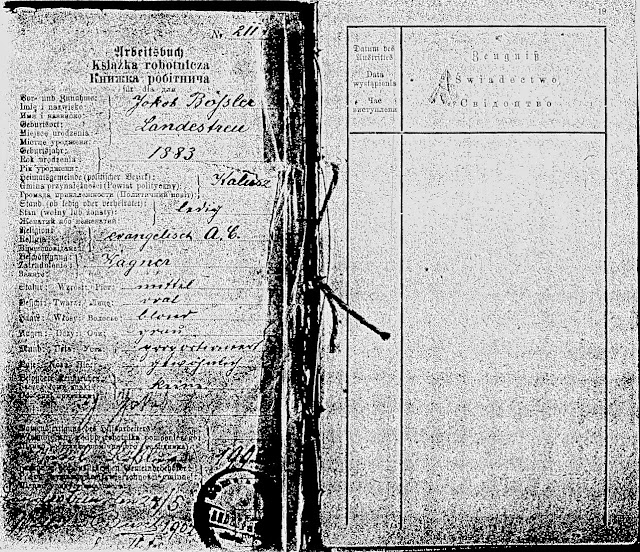 |
| From the writer's collection |
Landestreu was a small town populated by members of Jacob's extended family - Baumungs, Kandels, Lowenbergers and Beslers (spelled Bößler in this town map.
 |
| Courtesy of GalizienGermanDescencants.org |
Beslers were among the earliest residents of Landestreu moving from Germany in the 1770s. The Austro-Hungarian Empire invited foreign settlers into its newly acquired province of Galizien. German settlers found the offers of transportation and special status attractive and moved east.
More emigration was to come, this time westward. In 1872 the Dominion Land Act was enacted by Canada's Parliament. For a $10 registration fee a settler would receive 160 acres of land. He would have to live on the land for six months of the year for three years, clear at least 30 acres, erect a house worth at least $300 and be a naturalized British citizen. Canadian officials actively recruited in Europe for immigrants to settle western Canada.
 |
| Library and Archives Canada, collecitonscanada.gc.ca |
Some of the first settlers to take advantage of the Act were residents of Landestreu. They moved to Saskatchewan in 1890 and founded a village also named Landestreu in honour of their home in Galicia. The name of the town was eventually to changed to MacNutt in 1909 in honour of Thomas MacNutt, who was the Member of the Legislative Assembly at the time. But in 1902 it was still called Landestreu and this was the town that Jacob Besler emigrated to.
I have not yet been able to find Jacob on a passenger list but hope one day to locate him. I like to picture him heading for North America with other young men from his town, perhaps some of the Baumung and Kandel cousins who show up on Census records in the same part of Saskatchewan. He appears to have left Galicia in 1902 as his passport shows that year as does his land patent application. He was 18 years old
 |
| From the writer's collection |
Jacob's passport lists his employment as "wagner" (wagon driver or wagon maker). Perhaps his opportunities were limited in the small village of Landestreu. No doubt the lure of free land beckoned.
By 1910 Jacob had met all the Land Act requirements and successfully claim his property. In reviewing his file I found that he had returned his first plot of land as it was too rocky to farm
 |
| Taken by the writer June 2018 |
The first land was granted to another settler; Jacob had more luck with is second grant of land which he took possession of in 1906.
 |
| Saskatchewan Archives Board, Department of the Interior |
The immigration agents did not tell potential immigrants how hard it was to farm in Canada. They did not tell them how harsh the prairie winters were. But the farmers carried on. My grandparents married in 1915. A wife and family were needed to help farm as hired help were few and far between. My grandmother Bena and the older Besler children were expected to help with chores. My mother was the youngest girl and didn't have too many chores during the farm years. Here she is as a baby.
And with her Dad outside the family home.
 |
| From the writer's collection |
The family resided in the log cabin that Jacob built. It was neither roomy nor well-insulated. My mother remembers lying in bed looking at the icicles that had formed on the roof of the cabin. The three girls slept together for warmth. The children walked several miles to a one room school house that was actually located over the provincial border in Manitoba.
My sister, niece and I recently visited the area with the mother - it was the first time she had returned to Saskatchewan since she was a child.
 |
| Taken by the writer June 2018 |
Obviously there were changes but the isolation remains. Homes are far apart on large plot of land. As of 2006 there were only 80 people living in MacNutt.
 |
| Taken by writer June 2018 |
Winters were particularly isolating. Even now the roads in the area are dirt and gravel only. There would have been no snow clearing. The family rarely went into town and did not even attend church on a regular basis. My mother remembers attending the Christmas pageant at the school. The family would pile into the sleigh with warm bricks wrapped in blankets to keep the cold out.
The 1930s were especially harsh in Saskatchewan and unfortunately Jacob was no longer able to support his family by farming. After over 30 years he abandoned the farm and moved to Winnipeg. I can only imagine how difficult it must have been for him. Jacob worked for the Canadian National Railway in Winnipeg. In the late 1940s Jacob and Bena moved to Toronto to join their children. My grandfather died in 1961 when I was two years old so I don't really remember him. I do like this picture of him and me though!
 |
| From the writer's collection |
On Canada Day I salute Jacob Besler for leaving his home in Europe to come to Canada. He was a 20th Century pioneer and played an important role in settling our western provinces. He helped make Canada the wonderful country it is today through sacrifice and perseverance and I am thankful that he did.



Beautifully written! Thank you for letting us be a part of your journey into our family's past!
ReplyDeleteGreat read Gillian!
ReplyDelete